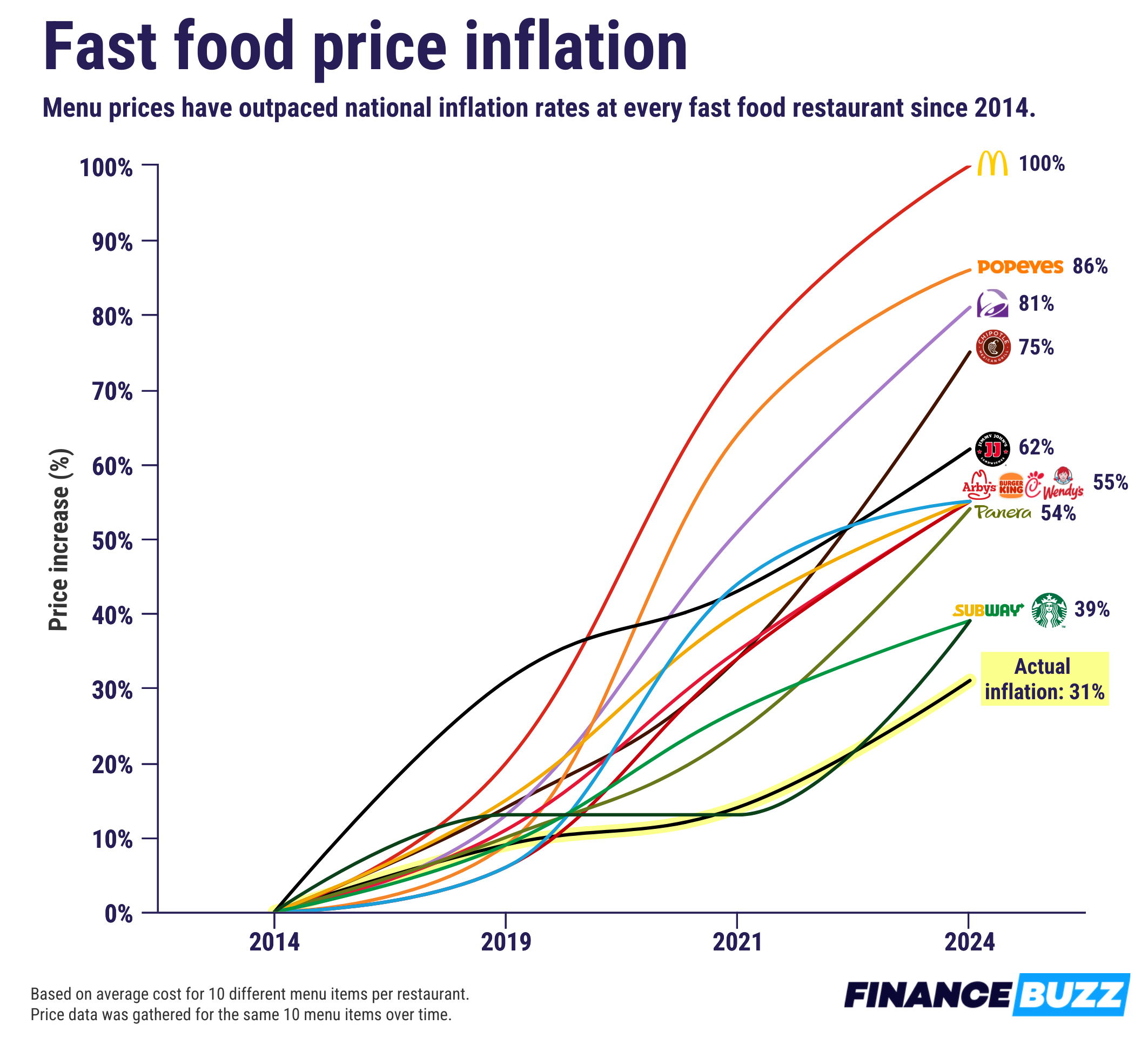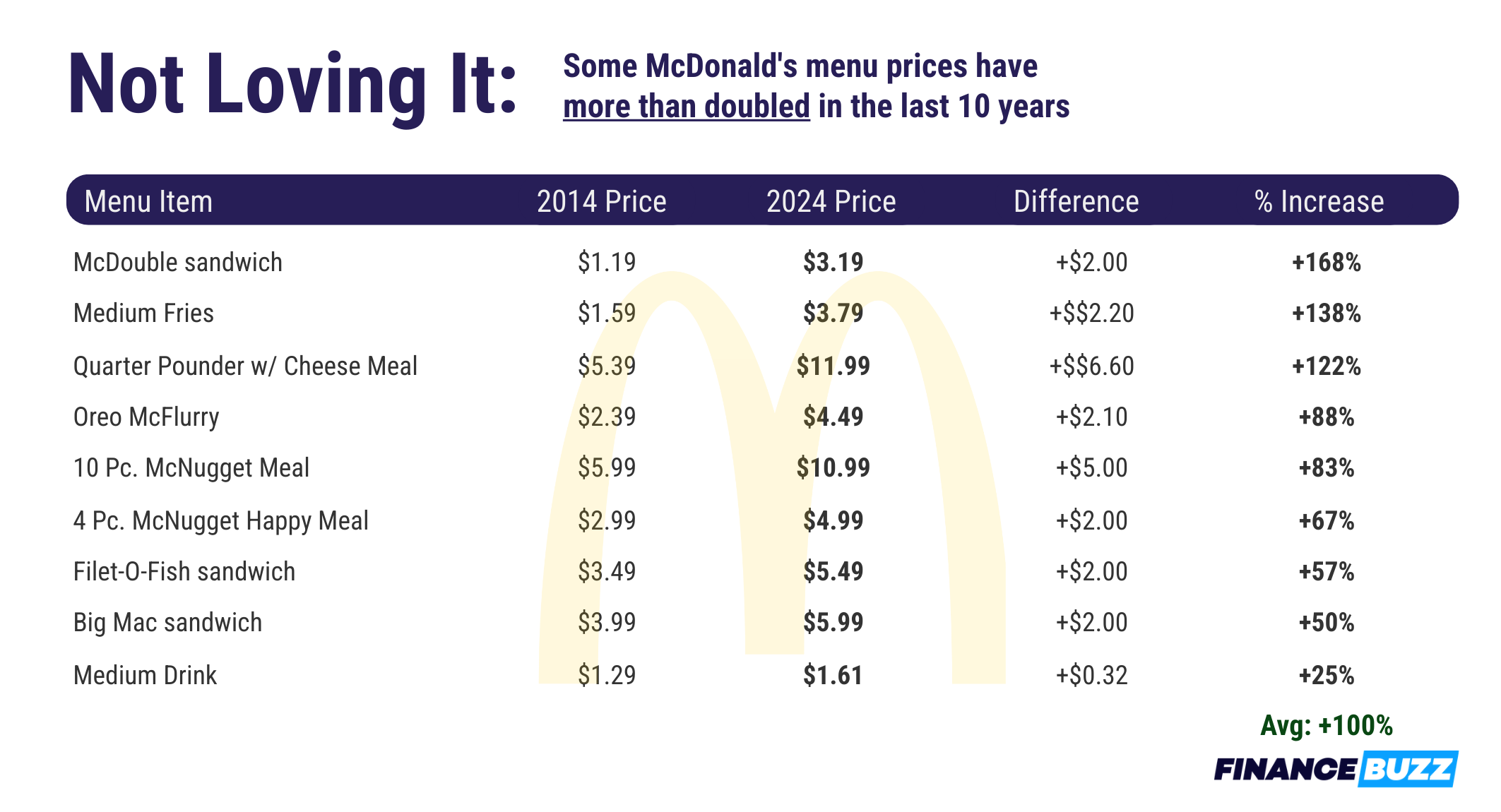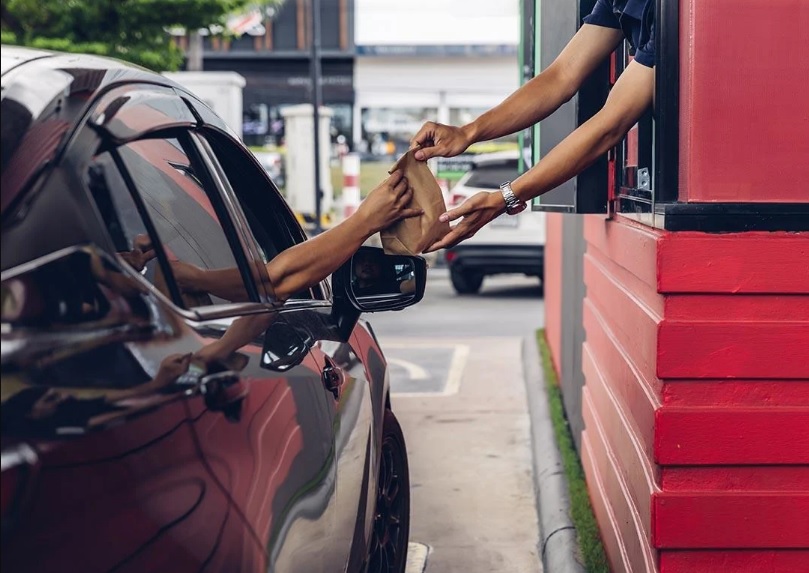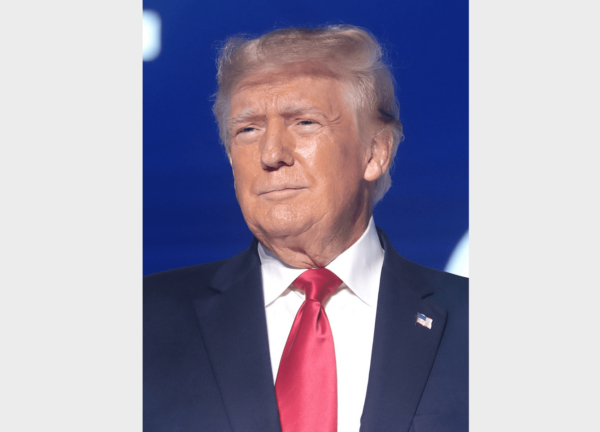By Chris Lewis
It’s no secret that things just keep getting more expensive. From home prices to personal goods, the cost of living in the U.S. has increased 22% since 2019, leaving consumers searching for ways to combat rising costs.
As Americans scramble to find better ways to budget, one historically wallet-friendly option, fast food, is becoming less and less of a cost-saver. In fact, fast food price hikes have outpaced the national inflation rate in some instances, prompting backlash online and on social media.
Have fast food prices really changed so dramatically? And if so, by how much? FinanceBuzz, is always looking for ways to save money and wanted to better understand how much a trip to the drive thru was really costing consumers. To find out, FinanceBuzz collected pricing data from a dozen popular fast food restaurants over the past decade and calculated how much prices have risen compared to the national inflation rate.
FinanceBuzz
How does fast food inflation compare to actual inflation?
According to the Bureau of Labor Statistics, the cost of goods in the U.S. has risen 31% since 2014, meaning $100 in 2014 dollars is worth $131 in 2024 dollars. Much of this change has happened in the past 5 years — inflation is up 22% since 2019.
So how do the average menu price increases at popular fast food chains compare to those rates?
The restaurants FinanceBuzz evaluated raised prices by 60% on average between 2014 and 2024. That means they’ve raised prices at a rate nearly double the national rate of inflation.
Five different restaurants — McDonald’s, Popeyes, Taco Bell, Chipotle, and Jimmy John’s — raised their prices at more than double the national inflation rate. McDonald’s raised prices so much that their average menu prices increased more than three times the national rate of inflation.
Beyond the golden arches, the data reveals more than a 75% price increase at Popeyes, Taco Bell, and Chipotle over the past 10 years. Subway and Starbucks, on the other hand, kept prices the most stable of any major chain, but still outpaced national inflation. Here are some notable examples.
FinanceBuzz
Gold-tier prices at the Golden Arches: McDonald’s prices have risen the most
The worst offender for dramatic price increases is McDonald’s — a chain that recently went viral for all the wrong reasons. An $18 Big Mac combo garnered so much attention online that the McDonald’s CEO promised affordability on a recent earnings call. According to our data, prices at McDonald’s have doubled since 2014, with an average price increase of 100%.
Overall, this rate is more than triple the national inflation rate during the same time. One illustrative example is the McChicken sandwich: once a staple of the chain’s $1 menu in 2014, the sandwich now costs $3 at some locations, a 200% increase.
Other former value menu items, like the McDouble and a simple order of medium fries were among the most egregious price increases across the McD’s menu.
What Rising Fast Food Prices Mean for Consumers
Though incremental changes in fast food prices may not seem like the highest dollar-value changes to consumers’ wallets, they are an illustrative example of a new financial reality in the U.S. — your dollar doesn’t go as far as it used to and American families need to figure out how to make it work.
Another place many Americans have been feeling the squeeze is with auto insurance. As premiums have risen more than 20% in the past year, many are scrambling to find cheaper car insurance options. And like with fast food, the premium hikes tend to hurt lower income earners the most.
Some are turning to credit cards to make up the gap. After a few years of declining balances, credit card debt has climbed back to an all-time high. Cards that have balance transfer incentives and 0% intro APR offers look especially enticing to anyone who is trying to close a gap on their monthly budget or looking for debt relief.
For others, there’s no way to stretch more on their current income so they’re turning to ways to make extra income on the weekends or find higher-paying jobs. With no easy solution and no relief in sight, inflation is likely to remain a top concern for Americans heading into this year’s presidential election. In fact,a recent FinanceBuzz survey found that inflation is the top financial issue among American voters right now.
Other notable fast-flation examples
Taco Bell
- Average price increase: 81%
- Notable price hikes: A Doritos Locos Taco went from an average price of $1.39 in 2014 to $2.59 in 2024 (+86%), while a Cheesy Gordita Crunch has doubled in price from $2.49 in 2014 to $4.99 today. The Beefy 5-Layer Burrito, which went from an average cost of $1.59 in 2014 to a present-day price of $3.69. That’s a 132% increase.
Chipotle
- Average price increase: 75%
- Notable price hikes: In 2014, hungry customers could get an entree, such as a burrito, bowl, or tacos, for less than $6.75 on average. Those same meals all cost $10.50 or more today. And while guac has always cost extra, it costs 64% more now than it did 10 years ago ($1.80 to $2.95 on average).
Starbucks
- Average price increase: 31%
- Notable price hikes: Interesting, some beloved Starbucks menu items have kept pace with inflation, such as their Chai Tea Latte (+30%) and their Mocha Frappuccino (+32%). Even better for Starbucks fans and their wallets, costs for certain items such as a Caffè Latte (+22%) and Caramel Macchiato (+17%) have actually risen slower than inflation, which makes them a better deal now than they were a decade ago.
Full results and methodology
For a full methodology and a chart featuring all the data collected, please visit the full study.
Easy ways to save on your next fast-food order
- Earn cash back and rewards. Learn about the best credit cards to use when dining out. These cards can help you earn cash back or discounts when going out for a meal.
- Download the mobile apps. Many fast food restaurants, including McDonald’s, offer discounts and deals just for using their mobile app.
- Watch for upcoming deals. McDonald’s is reportedly considering offering a $5 meal deal to win back consumers who are unhappy with rising prices. Look for other fast food chains to follow suit.
This story was produced by FinanceBuzz and reviewed and distributed by Stacker Media.
Re-published with CC BY-NC 4.0 License.







